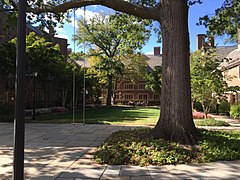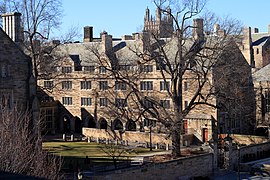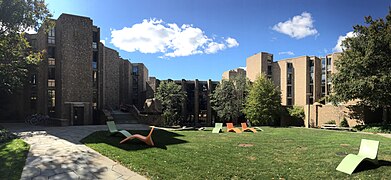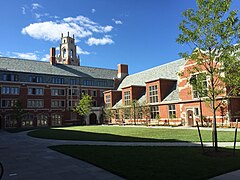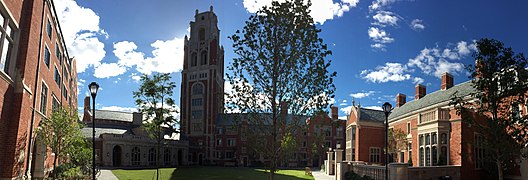Yale University
Yale University is a private Ivy League research university in New Haven, Connecticut. Founded in 1701, Yale is the third-oldest institution of higher education in the United States, and one of the nine colonial colleges chartered before the American Revolution.[7]
"Yale" redirects here. For other uses, see Yale (disambiguation).
Former names
Collegiate School (1701–1718)
Yale College (1718–1887)
Lux et veritas (Latin)
אורים ותמים (Hebrew)
"Light and truth"
October 9, 1701
$40.7 billion (2023)[1]
5,259 (Fall 2022)[4]
14,806 (Fall 2022)[5]
6,590 (Fall 2022)[5]
5,344 (Fall 2022)[5]
Midsize city, 1,015 acres (411 ha)
Yale was established as the Collegiate School in 1701 by Congregationalist clergy of the Connecticut Colony. Originally restricted to instructing ministers in theology and sacred languages, the school's curriculum expanded, incorporating humanities and sciences by the time of the American Revolution. In the 19th century, the college expanded into graduate and professional instruction, awarding the first PhD in the United States in 1861 and organizing as a university in 1887. Yale's faculty and student populations grew rapidly after 1890 due to the expansion of the physical campus and its scientific research programs.
Yale is organized into fourteen constituent schools, including the original undergraduate college, the Yale Graduate School of Arts and Sciences and Yale Law School.[8] While the university is governed by the Yale Corporation, each school's faculty oversees its curriculum and degree programs. In addition to a central campus in downtown New Haven, the university owns athletic facilities in western New Haven, a campus in West Haven, and forests and nature preserves throughout New England. As of 2023, the university's endowment was valued at $40.7 billion, the third largest of any educational institution.[1] The Yale University Library, serving all constituent schools, holds more than 15 million volumes and is the third-largest academic library in the United States.[9][10] Student athletes compete in intercollegiate sports as the Yale Bulldogs in the NCAA Division I Ivy League conference.
As of October 2020, 65 Nobel laureates, five Fields medalists, four Abel Prize laureates, and three Turing Award winners have been affiliated with Yale University. In addition, Yale has graduated many notable alumni, including five U.S. presidents, 10 Founding Fathers, 19 U.S. Supreme Court Justices, 31 living billionaires,[11] 54 college founders and presidents, many heads of state, cabinet members and governors. Hundreds of members of Congress and many U.S. diplomats, 78 MacArthur Fellows, 263 Rhodes Scholars, 123 Marshall Scholars, 81 Gates Cambridge Scholars, 102 Guggenheim Fellows and nine Mitchell Scholars have been affiliated with the university. Yale's current faculty include 67 members of the National Academy of Sciences,[12] 55 members of the National Academy of Medicine,[13] 8 members of the National Academy of Engineering,[14] and 187 members of the American Academy of Arts and Sciences.[15]
Academic rankings
9
2
5
8
3
11
16
10
11
Academics[edit]
Admissions[edit]
Undergraduate admission to Yale College is considered "most selective" by U.S. News.[153][154] In 2022, Yale accepted 2,234 students to the Class of 2026 out of 50,015 applicants, for an acceptance rate of 4.46%.[155] 98% of students graduate within six years.[156]
Through its program of need-based financial aid, Yale commits to meet the full demonstrated financial need of all applicants, and the university is need-blind for both domestic and international applicants.[157] Most financial aid is in the form of grants and scholarships that do not need to be paid back to the university, and the average need-based aid grant for the Class of 2017 was $46,395.[158] 15% of Yale College students are expected to have no parental contribution, and about 50% receive some form of financial aid.[156][159][160] About 16% of the Class of 2013 had some form of student loan debt at graduation, with an average debt of $13,000 among borrowers.[156] For 2019, Yale ranked second in enrollment of recipients of the National Merit $2,500 Scholarship (140 scholars).[161]
Half of all Yale undergraduates are women, more than 39% are ethnic minority U.S. citizens (19% are underrepresented minorities), and 10.5% are international students.[158] 55% attended public schools and 45% attended private, religious, or international schools, and 97% of students were in the top 10% of their high school class.[156] Every year, Yale College also admits a small group of non-traditional students through the Eli Whitney Students Program.
Notable people[edit]
Benefactors[edit]
Yale has had many financial supporters, but some stand out by the magnitude or timeliness of their contributions. Among those who have made large donations commemorated at the university are: Elihu Yale, Jeremiah Dummer, the Vanderbilt family, the Harkness family (Edward, Anna, and William), the Beinecke family (Edwin, Frederick, and Walter), John William Sterling, Payne Whitney, Joseph Earl Sheffield, Paul Mellon, Charles B. G. Murphy, Joseph Tsai, William K. Lanman, and Stephen Schwarzman. The Yale Class of 1954, led by Richard Gilder, donated $70 million in commemoration of their 50th reunion.[243] Charles B. Johnson, a 1954 graduate of Yale College, pledged a $250 million gift in 2013 to support the construction of two new residential colleges.[244] The colleges have been named respectively in honor of Pauli Murray and Benjamin Franklin. A $100 million contribution[245] by Stephen Adams enabled the Yale School of Music to become tuition-free and the Adams Center for Musical Arts to be built, while a $150 million contribution[246] by David Geffen enabled the Yale School of Drama (renamed the David Geffen School of Drama at Yale) to become tuition-free as well.
